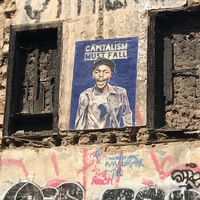Papers by Maria del Carmen Caña Jiménez
Revista Canadiense de Estudios Hispánicos, 2018
Este ensayo explora la violencia espectacular presente en Cromo como mecanismo de acceso a una f... more Este ensayo explora la violencia espectacular presente en Cromo como mecanismo de acceso a una forma de violencia que somatiza los efectos de las prácticas capitalistas y examina la ciudad de Buenos Aires como espacio metafórico de las políticas económicas del mercado global en el territorio nacional. Partiendo de las ideas de Rob Nixon (violencia lenta) y Achille Mbembe (necropolítica) arguyo que, bajo el desamparo del Estado-nación, el ciudadano es despojado de su subjetividad y que el enfoque en los espacios permite explorar cómo el deseo de acumulación del capitalismo tardío afecta al individuo, la nación y el medio ambiente.
ÍSTMICA. Revista de la Facultad de Filosofía y Letras
Las páginas a continuación giran en torno al salvadoreño Arturo Menéndez y buscan esclarecer el l... more Las páginas a continuación giran en torno al salvadoreño Arturo Menéndez y buscan esclarecer el lenguaje cinematográfico del autor a partir del análisis de la intertextualidad contenida en Cinema Libertad (2009). En ellas arguyo que, en Cinema Libertad, Menéndez propone la tesis de lo que será su producción como cineasta y sugiere diferentes vías para la renovación estética y ética del cine salvadoreño. En Cinema Libertad, Menéndez aboga por la capacidad creadora del cine y la libertad artística del autor al tiempo que invita a reflexionar –aunque de forma más íntima, crítica y meditativa que producciones audiovisuales más convencionales de la región– sobre las violencias que aún aquejan El Salvador.
Ed. by : FELIPE GÓMEZ GUTIÉRREZ, MARIA DEL CARMEN SALDARRIAGA Published by: Pontificia Universida... more Ed. by : FELIPE GÓMEZ GUTIÉRREZ, MARIA DEL CARMEN SALDARRIAGA Published by: Pontificia Universidad Javeriana.

Studies in Latin American Popular Culture
First airing on TVN between 2012 and 2014 and then acquired by Netflix in 2017, the television se... more First airing on TVN between 2012 and 2014 and then acquired by Netflix in 2017, the television series El reemplazante chronicles the narrative arc of Carlos Valdivia, a successful financial executive sentenced to three months in prison after committing securities fraud. After serving his sentence, he is fired from his lush position in the central business district of Sanhattan and returns to his humble origins in the San Miguel neighborhood of Santiago to work as a mathematics teacher. Here, he joins the students and other community members in fighting the privatization of the school system—a plot point based on real social tensions in Chile at the time of the series’ being broadcast. While at first glance it may seem that the protagonist’s politics aim to subvert the neoliberal status quo that is a result of economic measures taken during the years of Pinochet’s dictatorship, a closer analysis results in an altogether different reading. This essay explores the tropes of the tragic hero and superhero alluded to in the first episode of the series, to suggest that the dialectic planted by these narrative types allows an exploration of the mechanisms and structures of feeling (based on theories by Raymond Williams) of the neoliberal model. I analyze the circulation of emotions between the protagonist and his students, and—in a broader context—between the diegesis and the viewer. In doing so, I argue that the message of subversion is really not subversion at all, but rather a continuation and appeasement of the neoliberal ethos.

Bulletin of Spanish Studies
Abstract Este ensayo cuestiona y problematiza las tensiones presentes en la geografía humana meli... more Abstract Este ensayo cuestiona y problematiza las tensiones presentes en la geografía humana melillense a partir del análisis de las topografías históricas y las intensidades afectivas presentes en Lucía o la inasible sustancia del tiempo (2014) de Antonio Abad. El estudio del afecto en relación con los espacios, tanto físicos como epistemológicos, de la ciudad va a hacer posible un mejor entendimiento del conflicto identitario de la geografía cultural melillense—una geografía cultural que al tiempo que se enorgullece del multiculturalismo que lleva por bandera y que la hace diferente a otras regiones de España defiende a capa y a espada el relato fundacional de su españolidad (entendiéndose esta como sinónimo de su origen cristiano). Este estudio analiza también la manera en que estos espacios y la historia que estos contienen interaccionan con el sujeto y engendran subjetividades que en línea con los postulados teóricos de Sarah Ahmed hacen de la ciudad una ‘nación’ de tacto suave y duro simultáneamente.

Arizona Journal of Hispanic Cultural Studies
The "affective turn," or a critical focus on emotion and affect as a gateway into under... more The "affective turn," or a critical focus on emotion and affect as a gateway into understanding contexts and sites of experience, has come into vogue in the early twenty-first-century. Cinema Studies is an example of a field that has undergone this shift, as scholars, following Gilles Deleuze's meditations on cinema, have explored the presence and import of affect in the moving image. Vivian Sobchack, Laura Marks, Jennifer Barker, Eugenie Brinkema, and Elena del Río have furthered this inquiry into affect and embodiment as a means of knowing, and have included bodily experience (collective, individual, and in pieces) and circulations as a productive point of entry into global cinema. This shift into affect, however, has been slow to take shape in the research of Hispanic cinemas: aside from several key monographs and a series of articles, the methods and hermeneutics of affect-based analysis is a largely untapped field. This introduction examines the state of affect theory within Latin American cinema studies, presents the essays that follow, and seeks to elucidate how the scholarship in this field may nourish film theory on affect and phenomenology.Resumen:El "giro afectivo," o mejor dicho, el énfasis en la emoción y el afecto se ha erigido—a comienzos del siglo XXI—como un punto de entrada para analizar contextos y sitios de experiencia. Los estudios cinematográficos ejemplifican este cambio, donde una serie de investigadores—siguiendo los planteamientos teóricos de Gilles Deleuze—han explorado la presencia e importancia del afecto en el cine. Vivian Sobchack, Laura Marks, Jennifer Barker, Eugenie Brinkema y Elena del Río son algunos de los nombres destacados en este corpus teórico que ha hecho hincapié en el afecto como sistema de conocimiento, y ha incluido la subjetividad (colectiva, individual y fragmentada) y las circulaciones como puntos de partida productivos en el estudio del cine global. Este giro, sin embargo, ha sido lento en el campo del cine hispano. Aparte de unos escasos estudios monográficos y una serie de artículos, el análisis afectivo en nuestro campo se define por su rareza. Esta introducción examina el estado de las teorías del afecto en los estudios de cine latinoamericano, presenta los ensayos que siguen y muestra la manera en que la investigación en este campo podría nutrir las teorías cinematográficas de afecto y fenomenología.
Ojancano Revista De Literatura Espanola, 2008
Hispanic Research Journal, 2015
We study the possibility of relaxing the cosmological bound on the Higgs mass coming from the req... more We study the possibility of relaxing the cosmological bound on the Higgs mass coming from the requirement of non-erasure of the baryon asymmetry by sphalerons. After reviewing the Standard Model case we obtain this bound in two extensions of it: 1) The Standard Model with an additional gauge singlet, and 2) The Minimal Supersymmetric Standard Model. Taking fully into account all experimental constraints and thermal screening effects we found that the situation can be slightly improved with respect to the Standard Model but only in case 1) a non negligible region in parameter space exists where the baryon washout is avoided and the experimental bounds evaded.

Revista de Estudios Hispánicos, 2014
Al hablar de la producción literaria contemporánea de Colombia, sin duda alguna, se ha convertido... more Al hablar de la producción literaria contemporánea de Colombia, sin duda alguna, se ha convertido en un imperativo tratar el asunto de la violencia. Como temática, la violencia ha dado lugar a lo que comúnmente se ha llamado “novela de la violencia” y “novela sobre la violencia”. Durante las dos últimas décadas, la violencia, expresada en múltiples formas, ha seguido imperando en el panorama narrativo colombiano. Este ensayo aporta un grano de arena a las genealogías en torno a la producción cultural colombiana por medio de la propuesta de una nueva categoría estética. Esta nueva categoría estética articula taxonómicamente un discurso de la violencia que aparentemente ha perdido su conexión con el mundo real externo a la narrativa y emana de y/o penetra en los rincones más íntimos del ser. Propongo para ello el término “violencia fenomenológica”, forma de violencia cuyo máximo exponente es la producción novelística de Evelio Rosero. El presente estudio explora las diferentes manifestaciones de la violencia fenomenológica en Mateo solo, Papá es santo y sabio, Señor que no conoce la luna y En el lejero y toma Los ejércitos a modo de referente dentro de la genealogía narrativa de Rosero.

Romance Notes, 2014
La lucha contra el olvido ha sido durante las últimas décadas una de las principales preocupacion... more La lucha contra el olvido ha sido durante las últimas décadas una de las principales preocupaciones de políticos, intelectuales, historiadores y escritores. Durante los últimos años del siglo xx y las primeras décadas del siglo xxi hemos sido testigos del debate interno mantenido por muchas sociedades a favor de lo que comúnmente se ha denominado “recuperación de la memoria histórica.”1 algunos ejemplos de ello se encuentran en países como argentina, Chile, España, Guatemala y la República Surafricana. No obstante, lo que en un principio comenzó como un proceso cuyo eje de acción tenía unas limitaciones nacionales ha alcanzado, gradualmente, una dimensión global. Parte de este proceso se debe, indudablemente, a la presencia internacional de documentos tales como la Declaración Universal de Derechos Humanos adoptada por la asamblea General de las Naciones Unidas. Dentro de esta línea, lo que aquí nos interesa es explorar la forma en que lo literario sirve como medio o escenario viable para la realización de este proceso. Dicho de otro modo, lo que aquí nos concierne es dilucidar la manera en la que el texto literario emprende la labor de crear una conciencia internacional de derechos que es paralela al desarrollo de entidades, procesos y documentos jurídicos.

Symposium: A Quarterly Journal in Modern Literatures, 2014
This essay focuses on the writing of disgust as a central aesthetic project in contemporary Centr... more This essay focuses on the writing of disgust as a central aesthetic project in contemporary Central American narrative. Taking Horacio Castellanos Moya's El asco as a point of departure, I argue that an “aesthetics of disgust” can be underlined both as a recurrent trope or theme and as an aesthetic affect in works by a diverse group of authors. The article undertakes a detailed analysis of two Guatemalan novels: Diccionario esotérico (2005) by Maurice Echeverría and El leproso (2007) by Méndez Vides. Working with several theories of disgust and the transmission of affect, I argue that disgust is written in these fictions as a central thematic point and as a means to evoke a visceral reaction in the reader and that it reflects a wide-ranging literary movement that transcends genres and generations as it reflects upon the neoliberal episteme in the region.
Evelio Rosero y los ciclos de la creación literaria, 2017
Ed. by : FELIPE GÓMEZ GUTIÉRREZ, MARIA DEL CARMEN SALDARRIAGA
Published by: Pontificia Universida... more Ed. by : FELIPE GÓMEZ GUTIÉRREZ, MARIA DEL CARMEN SALDARRIAGA
Published by: Pontificia Universidad Javeriana.

Studies in Latin American Popular Culture, 2020
First airing on TVN between 2012 and 2014 and then acquired by Netflix
in 2017, the television se... more First airing on TVN between 2012 and 2014 and then acquired by Netflix
in 2017, the television series El reemplazante chronicles the narrative arc of Carlos Valdivia, a successful financial executive sentenced to three months in prison after committing securities fraud. After serving his sentence, he is fired from his lush position in the central business district of Sanhattan and returns to his humble origins in the San Miguel neighborhood of Santiago to work as a mathematics teacher. Here, he joins the students and other community members in fighting the privatization of the school system—a plot point based on real social tensions in Chile at the time of the series’ being broadcast. While at first glance it may seem that the protagonist’s politics aim to subvert the neoliberal status quo that is a result of economic measures taken during the years of Pinochet’s dictatorship, a closer analysis results in an altogether different reading. This essay explores the tropes
of the tragic hero and superhero alluded to in the first episode of the series, to suggest that the dialectic planted by these narrative types allows an exploration of the mechanisms and structures of feeling (based on theories by Raymond Williams) of the neoliberal model. I analyze the circulation of emotions between the protagonist and his students, and—in a broader context—between the diegesis and the viewer. In doing so, I argue that the message of subversion is really not subversion at all, but rather a continuation and appeasement of the neoliberal ethos.

Bulletin of Spanish Studies, 2020
Este ensayo cuestiona y problematiza las tensiones presentes en la geografía humana melillense a ... more Este ensayo cuestiona y problematiza las tensiones presentes en la geografía humana melillense a partir del análisis de las topografías históricas y las intensidades afectivas presentes en Lucía o la inasible sustancia del tiempo (2014) de Antonio Abad. El estudio del afecto en relación con los espacios, tanto físicos como epistemológicos, de la ciudad va a hacer posible un mejor entendimiento del conflicto identitario de la geografía cultural melillense—una geografía cultural que al tiempo que se enorgullece del multiculturalismo que lleva por bandera y que la hace diferente a otras regiones de España defiende a capa y a espada el relato fundacional de su españolidad (entendiéndose esta como sinónimo de su origen cristiano). Este estudio analiza también la manera en que estos espacios y la historia que estos contienen interaccionan con el sujeto y engendran subjetividades que en línea con los postulados teóricos de Sarah Ahmed hacen de la ciudad una ‘nación’ de tacto suave y duro simultáneamente.

——————————————————————————— Violencia, necropolítica y capitalocene en Cromo Este ensayo explora ... more ——————————————————————————— Violencia, necropolítica y capitalocene en Cromo Este ensayo explora la violencia espectacular presente en Cromo como mecanismo de acceso a una forma de violencia que somatiza los efectos de las prácticas capitalistas y examina la ciudad de Buenos Aires como espacio metafórico de las políticas económicas del mercado global en el territorio nacional. Partiendo de las ideas de Rob Nixon (violencia lenta) y Achille Mbembe (necropolítica) arguyo que, bajo el desamparo del Estado-nación, el ciudadano es despojado de su subjetividad y que el enfoque en los espacios permite explorar cómo el deseo de acumulación del capitalismo tardío afecta al individuo, la nación y el medio ambiente. Palabras claves: serial televisivo, Argentina, violencia, necropolítica, neoliberalismo This essay examines the presence of spectacular violence in Cromo as a point of entry into the effects of capitalist practices, and analyzes the role of Buenos Aires as a metaphoric space of the global marketplace within the political boundaries of the nation. Parting from theoretical ideas by Rob Nixon (slow violence) and Achille Mbembe (necropolitics) I argue that the disenfranchised citizen lives under the organizing logic of a politics of death. It is through the focus on the different spaces that the series demonstrates how the insatiable desire of late capitalist accumulation affects the individual, nation, and environment. Threats from civilization are bringing about a kind of new " shadow kingdom, " comparable to the realm of the gods and demons in antiquity, which is hidden behind visible world and threatens human life on their Earth. People no longer correspond today with spirits residing in things but find themselves exposed to " radiation, " ingest " toxic levels, " and are pursued into their very dreams by the anxiety of a " nuclear holocaust " … Dangerous, hostile substances lie concealed behind the harmless facades.
abStraCt Arturo Menéndez's award-winning Malacrianza/The Crow's Nest (2014) chronicles the tribul... more abStraCt Arturo Menéndez's award-winning Malacrianza/The Crow's Nest (2014) chronicles the tribulations of Don Cleo, a poor piñata salesman suffering from mental and physical ailments. Cleo's life is turned upside down when he receives an extortion letter asking for US$500 in exchange for his life. This article examines Malacrianza's linkage between the protagonist's body and his ailments and the broader sociopo-litical matrix. I argue that the symptoms he demonstrates are manifestations of the impact of civil war and urban violence upon the social telos of Central America. My study explores phenomenological film analysis as a tool for examining affects and their circulations in the film. By using an affective code, Malacrianza engages the viewer in an intimate experience of the violence(s) of contemporary El Salvador.

Este ensayo toma como punto de partida las oportunas teorizaciones elaboradas por Ignacio Sánchez... more Este ensayo toma como punto de partida las oportunas teorizaciones elaboradas por Ignacio Sánchez Prado en torno a las estructuras neoliberales de sentimiento presentes en la comedia romántica mexicana y explora la presencia de estas estructuras en una película perteneciente a un género cinematográfico diferente-el drama. Malos hábitos (2007) de Simón Bross relata, a partir de dos líneas argumentales yuxtapuestas, las nefastas consecuencias que se desprenden del insaciable deseo de alcanzar un ideal. A diferencia de la comedia romántica mexicana, las estructuras de sentimiento presentes en Malos hábitos no se articulan necesariamente a partir de la historia romántica sino, más bien, a partir de los discursos de control alimenticio y disciplina corporal que rigen las vidas de las protagonistas. Las estructuras de sentimiento presentes en Malos hábitos también producen un lenguaje afectivo que pertenece exclusivamente a las clases media y alta ya que el control dietético y la disciplina corporal no son prácticas democráticas a las que todos los sectores de la sociedad puedan acceder sino, más bien, prácticas excluyentes que confirman la cada vez mayor división de clases que impera en la sociedad. Las páginas a continuación arguyen que la experiencia sensorial que el espectador comparte con la realidad cinematográfica constituye una fuente epistemológica de la insaciable maquinaria de deseo sobre la que se asienta el episteme neoliberal-maquinaria de deseo que nutre, a su vez, la estructura de sentimiento que hace posible la conexión ideológica y somática del espectador con lo plasmado en la pantalla.

The "affective turn," or a critical focus on emotion and affect as a gateway into understanding c... more The "affective turn," or a critical focus on emotion and affect as a gateway into understanding contexts and sites of experience, has come into vogue in the early twenty-first-century. Cinema Studies is an example of a field that has undergone this shift, as scholars, following Gilles Deleuze's meditations on cinema, have explored the presence and import of affect in the moving image. Vivian Sobchack, Laura Marks, Jennifer Barker, Eugenie Brinkema, and Elena del Río have furthered this inquiry into affect and embodiment as a means of knowing, and have included bodily experience (collective, individual, and in pieces) and circulations as a productive point of entry into global cinema. This shift into affect, however, has been slow to take shape in the research of Hispanic cinemas: aside from several key monographs and a series of articles, the methods and hermeneutics of affect-based analysis is a largely untapped field. This introduction examines the state of affect theory within Latin American cinema studies, presents the essays that follow, and seeks to elucidate how the scholarship in this field may nourish film theory on affect and phenomenology.

El objetivo de esta edición crítica, tentativamente titulada Mutantes y monstruos: biopolítica y ... more El objetivo de esta edición crítica, tentativamente titulada Mutantes y monstruos: biopolítica y ciudadanía en la cultura latinoamericana, es proponer una aproximación transnacional que permita entender las diferentes formas en las que el neoliberalismo cuestiona, controvierte e incluso muta el concepto de ciudadanía y, consecuentemente, la idea del derecho en un espacio cada vez más privatizado y global. Este proyecto surge del creciente interés existente en torno a la crítica neoliberal y las diferentes formas de violencia ligadas a este paradigma político-económico tanto dentro como fuera del campo crítico del hispanismo. El proyecto aquí presente busca examinar y problematizar el concepto de ciudadanía en conexión con asuntos tales como la violencia, el antropoceno, la biopolítica y lo transnacional. Dicho de otro modo, este proyecto se propone explorar la manera en que los cambios político-económicos de la contemporaneidad están provocando la mutación de la subjetividad sobre la que asienta la base del Estado-nación. Se espera que los ensayos compilados en Mutantes y monstruos sean de carácter interdisciplinario y conecten ideas pertenecientes tanto al campo de la teoría política y crítica como al campo de los estudios culturales, la teoría literaria y el cine. Se espera también que las contribuciones aquí recogidas interroguen la producción cultural desde múltiples ángulos siendo este volumen de interés para académicos en campos tales como el de los estudios de género, el post-colonialismo, la eco-crítica y los estudios visuales.











Uploads
Papers by Maria del Carmen Caña Jiménez
Published by: Pontificia Universidad Javeriana.
in 2017, the television series El reemplazante chronicles the narrative arc of Carlos Valdivia, a successful financial executive sentenced to three months in prison after committing securities fraud. After serving his sentence, he is fired from his lush position in the central business district of Sanhattan and returns to his humble origins in the San Miguel neighborhood of Santiago to work as a mathematics teacher. Here, he joins the students and other community members in fighting the privatization of the school system—a plot point based on real social tensions in Chile at the time of the series’ being broadcast. While at first glance it may seem that the protagonist’s politics aim to subvert the neoliberal status quo that is a result of economic measures taken during the years of Pinochet’s dictatorship, a closer analysis results in an altogether different reading. This essay explores the tropes
of the tragic hero and superhero alluded to in the first episode of the series, to suggest that the dialectic planted by these narrative types allows an exploration of the mechanisms and structures of feeling (based on theories by Raymond Williams) of the neoliberal model. I analyze the circulation of emotions between the protagonist and his students, and—in a broader context—between the diegesis and the viewer. In doing so, I argue that the message of subversion is really not subversion at all, but rather a continuation and appeasement of the neoliberal ethos.
Published by: Pontificia Universidad Javeriana.
in 2017, the television series El reemplazante chronicles the narrative arc of Carlos Valdivia, a successful financial executive sentenced to three months in prison after committing securities fraud. After serving his sentence, he is fired from his lush position in the central business district of Sanhattan and returns to his humble origins in the San Miguel neighborhood of Santiago to work as a mathematics teacher. Here, he joins the students and other community members in fighting the privatization of the school system—a plot point based on real social tensions in Chile at the time of the series’ being broadcast. While at first glance it may seem that the protagonist’s politics aim to subvert the neoliberal status quo that is a result of economic measures taken during the years of Pinochet’s dictatorship, a closer analysis results in an altogether different reading. This essay explores the tropes
of the tragic hero and superhero alluded to in the first episode of the series, to suggest that the dialectic planted by these narrative types allows an exploration of the mechanisms and structures of feeling (based on theories by Raymond Williams) of the neoliberal model. I analyze the circulation of emotions between the protagonist and his students, and—in a broader context—between the diegesis and the viewer. In doing so, I argue that the message of subversion is really not subversion at all, but rather a continuation and appeasement of the neoliberal ethos.